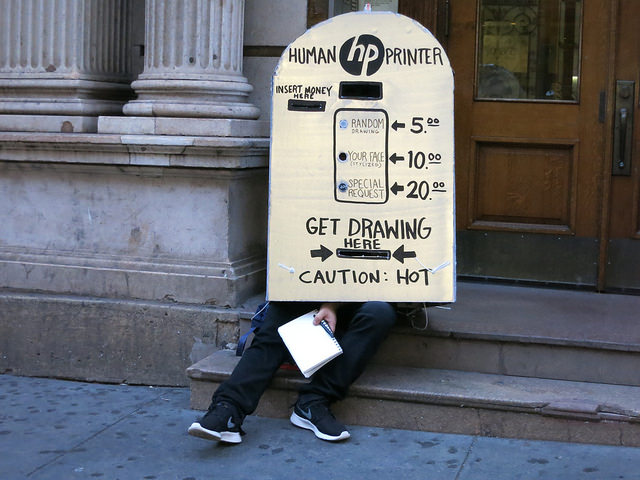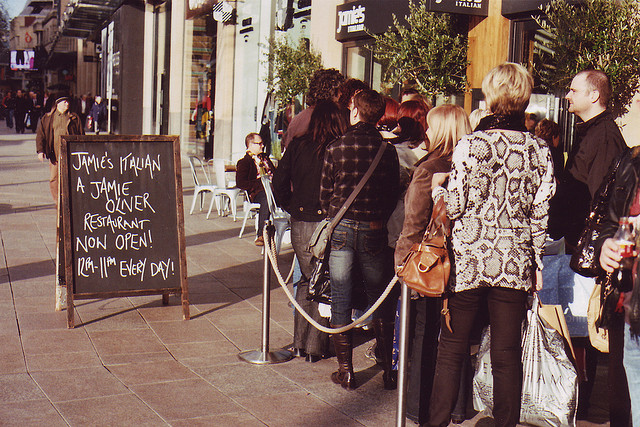Unlock the Magic in Your Story Now
Get the Free 20 questions to Ask Before Launching Your Idea workbook when you sign up for occasional updates.
Get the Free 20 questions to Ask Before Launching Your Idea workbook when you sign up for occasional updates.
Articles filed in: Marketing
Problem/Product Fit
filed in Marketing, Storytelling, Strategy
 Before you write the code, buy the domain name, design the logo, rent the office space or print the business cards ask yourself these questions.
Before you write the code, buy the domain name, design the logo, rent the office space or print the business cards ask yourself these questions.
5 questions for every entrepreneur to answer
1. Who is your customer?
2. What does she want to do, but can’t?
3. How exactly does your product or service help her?
4. Why will she choose your product or service above your competitor’s?
5. How (in words and actions) will she tell people about it?
Don’t start with your product road map—start with your customer’s story.
Image by Tina Leggio
Who Do You Think Your Customers Are?
 It was a beautiful spring day in one of the most coveted (and expensive), Melbourne suburbs to live (and buy a home) in. The tree-lined streets were beginning to sprout pink blossoms and the afternoon sun warmed the porches of restored Victorian homes.
It was a beautiful spring day in one of the most coveted (and expensive), Melbourne suburbs to live (and buy a home) in. The tree-lined streets were beginning to sprout pink blossoms and the afternoon sun warmed the porches of restored Victorian homes.
There on one of those porches, behind a well-kept garden, in a favoured street, sat a man with his morning coffee in one hand and a coin that he was rubbing away on a ‘scratch and win’ lottery card in the other. He didn’t look up as we passed, he didn’t even notice us, or that fact that he had already won the lottery just by being able to sit right where he was.
The whole scene challenged my assumptions, that’s for sure.
It’s easy to assume that we know what people want because we know where they live, how old they are, what they earn and on and on. And just as valuable to look beyond demographics, segments and stereotypes to what the people we hope to serve do and why.
Image by Tina Leggio.
How To Avoid Getting Lost In The Crowd
filed in Marketing, Storytelling, Strategy
 It’s natural to want to create something for the most people we think we can reach. The runaway successes we aspire to emulate seem like they succeeded by appealing to everyone. But if you look a little closer you’ll find that even the big hits started at the edges.
It’s natural to want to create something for the most people we think we can reach. The runaway successes we aspire to emulate seem like they succeeded by appealing to everyone. But if you look a little closer you’ll find that even the big hits started at the edges.
Soul Cycle, Starbucks and Secret Garden weren’t for everyone.
Taking a stand, being this and not that, or choosing one option at the expense of another feels risky, but that’s exactly what we must do to avoid getting lost in the crowd.
There are a hundred different tactics that can help you to be found by everyone, and a handful of small choices that will make you meaningful to the people you really care about serving.
We know that a lover’s whisper is more powerful than a stranger’s bellow.
You get to choose which you want to be.
Image by Eric Sonstroem.
3 Things Your About Page Should Do
filed in Marketing, Storytelling, Strategy
 Writing an about page for your website is hard. The reason we get stuck is because we worry about what we need to write, instead of focusing on why we need to write it in the first place. Remember it’s less about blowing your trumpet or filling whitespace with information and more about helping your customer to get the information she is looking for.
Writing an about page for your website is hard. The reason we get stuck is because we worry about what we need to write, instead of focusing on why we need to write it in the first place. Remember it’s less about blowing your trumpet or filling whitespace with information and more about helping your customer to get the information she is looking for.
Your about page needs to do three things:
1. BUILD TRUST
Your prospective customer has probably never met you, so it stands to reason that she’s looking for clues to help her understand why she should trust you. A photo, short back story about your professional credentials and testimonials from clients you have worked with will help. Add links to social media accounts, media releases, portfolio or case studies to support your story.2. LET THE CUSTOMER KNOW THAT YOU UNDERSTAND AND CAN HELP HER
Your about page needs to show the customer you understand why she visited your website and that you can help her to do what she wants to do. Describe some of the problems she has, the challenges she is facing and the products and services you provide to fulfil her wants or address her needs.3. SHOW PEOPLE HOW TO CONTACT YOU
Make it easy for the customer to take the next steps by adding your contact details or other calls to action like, ‘visit our store’ or ’email us’.Think of your about page as a service to your customer rather than a way to selfishly promote and you can’t go wrong.
UPDATE: Need more help?
The About Page Guide will take you step-by-step through the process.
Image by Alex O.
What’s The Endgame?
 As anyone who has ever played chess will tell a beginner, every move must have a purpose.
As anyone who has ever played chess will tell a beginner, every move must have a purpose.
You don’t move a piece unless you have a reason for doing so, or before you understand what the next move is likely to be, and the one after that (depending on how your opponent responds).
One single great move in isolation is not enough to keep you in the game.
And yet as business owners and leaders we make reactive moves all the time, often without linking those moves to our endgame.
Why exactly are you planning to expand your reach?
What’s the purpose of those scheduled tweets?
Why have you chosen to launch this product now?
If that works, where to next and why?
Everything you’ve done at your desk today and are going to do tomorrow, is a move with and end in mind—or it should be. Where are you hoping those moves you’re making will take you?
Image by Denis.
How Winners Win
 Do you remember playing musical chairs as a child? As with many games the same people who seemed to ‘have a knack’ or ‘get the hang of it’ always won. I was terrible at musical chairs. I was the kid who hedged her bets, tried to hold on, or scoot around the chairs half sitting, half standing, trying to maintain some kind of contact between buttock and seat.
Do you remember playing musical chairs as a child? As with many games the same people who seemed to ‘have a knack’ or ‘get the hang of it’ always won. I was terrible at musical chairs. I was the kid who hedged her bets, tried to hold on, or scoot around the chairs half sitting, half standing, trying to maintain some kind of contact between buttock and seat.
It was the worst strategy!
In the end I started paying attention to the winners. They didn’t hedge their bets by half claiming each chair as they went past. They lolloped around confidently. They never won by trying to guess when the music would stop or by concentrating harder than everyone else, because that doesn’t work either. And they hardly paid attention at all to what the other kids might do next. No, the winners I discovered didn’t focus on the other competitors or even to the chairs in the middle. They kept their eyes firmly fixed on the mum who was in charge of the music and waited for her finger to come into contact with the pause button on the music player.
The winners watched what was going on around them. They paid attention to the context surrounding the game and not just the game itself.
Musical chairs was my first lesson in what it takes to win—it usually involves looking beyond what’s right under your nose.
Image by Joe Utsler.
 The goal of most marketing is to get people through the door, bums on seats and products sold.
The goal of most marketing is to get people through the door, bums on seats and products sold. The best brand stories….
The best brand stories…. This is the story of two homes that are for sale.
This is the story of two homes that are for sale. A more important question to ask and answer is:
A more important question to ask and answer is: